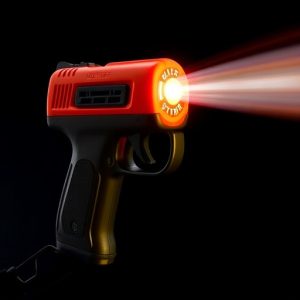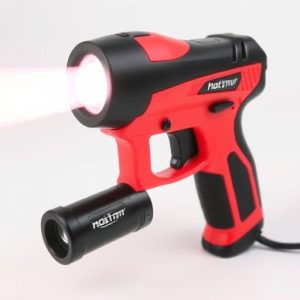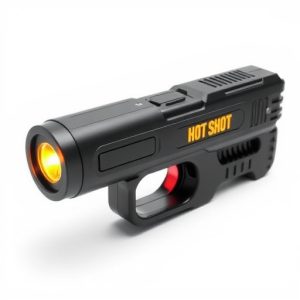Civilian Taser Ownership: State Laws, Hot Shot Stun Gun Requirements, and Safety Training
The legal landscape surrounding civilian ownership of hot shot stun guns (tasers) varies significant…….
The legal landscape surrounding civilian ownership of hot shot stun guns (tasers) varies significantly across the US, with state regulations ranging from strict to permissive. Comprised under the Federal Firearm Act (FFA), these devices are subject to background checks, licensing, and federal restrictions. Prospective buyers must research their state's specific laws regarding age limits, training requirements, waiting periods, and registration to ensure legal acquisition. Non-compliance can result in penalties. Responsible ownership involves adhering to laws, proper handling, understanding the device's limitations, and using force as a last resort for self-defense.
“Exploring the legal landscape of civilian taser ownership is crucial in today’s safety-conscious world. This comprehensive guide delves into the state-by-state regulations governing the acquisition and use of hot shot stun guns. From understanding federal laws to navigating the diverse requirements across states, we break down everything you need to know. Learn about legal implications, permits, training, and safe practices for responsible taser ownership. By the end, folks will be equipped with the knowledge to make informed decisions regarding personal protection.”
- Understanding Civilian Taser Ownership: An Overview
- Federal Laws and Regulations Surrounding Stun Guns
- State-by-State Breakdown of Civilian Taser Requirements
- Legal Implications and Permits for Hot Shot Stun Gun Purchase
- Safety, Training, and Responsible Use of Civilian Tasers
Understanding Civilian Taser Ownership: An Overview
Civilian ownership of hot shot stun guns, also known as tasers, is a topic that has gained significant interest and controversy in recent years. Tasers have evolved from law enforcement tools to potential self-defense weapons for citizens. Understanding the legal landscape surrounding their possession is essential for anyone considering acquiring one. Each state in the US has its own set of regulations and requirements, ranging from strict licensing and training mandates to more relaxed guidelines, depending on local laws and perceptions of public safety.
The variability in state laws makes it crucial for prospective taser owners to research and familiarize themselves with the specific rules in their jurisdiction. Some states may require individuals to undergo extensive training and background checks before obtaining a permit to purchase and carry a stun gun. Others might have less stringent requirements, allowing responsible adults to own tasers without formal authorization. This overview emphasizes the need for transparency and knowledge to ensure safe and legal ownership of hot shot stun guns.
Federal Laws and Regulations Surrounding Stun Guns
The federal government has implemented regulations regarding stun guns, commonly known as hot shot stun guns, to ensure their safe and responsible use. These laws are in place to maintain public safety and prevent misuse of such devices. The Federal Firearm Act (FFA) classifies stun guns as “firearms” under specific circumstances, meaning they fall under the same regulatory framework as conventional firearms. This classification requires users to adhere to strict rules for ownership, possession, and transfer.
According to the FFA, a stun gun is considered a firearm if it is capable of expelling a projectile or energy that can cause physical harm or damage. As a result, personal use and possession of hot shot stun guns are subject to background checks, licensing requirements, and federal restrictions on interstate sales and transportation. These regulations aim to filter out potential threats and ensure that only responsible individuals can legally acquire and own stun guns.
State-by-State Breakdown of Civilian Taser Requirements
In the United States, the regulations surrounding civilian ownership of tasers vary greatly from state to state, creating a patchwork of laws and requirements that prospective buyers must navigate. This state-by-state breakdown highlights the diversity in access and restrictions for what is commonly known as a hot shot stun gun.
Some states have relatively relaxed rules, allowing individuals over a certain age to purchase tasers without extensive background checks or training. Others have more stringent measures, mandating permits or special licensing for civilian ownership. Certain jurisdictions may also restrict the types of tasers available to civilians, focusing primarily on lower-voltage models intended for personal protection rather than law enforcement-grade devices with higher power outputs. This variation underscores the need for responsible individuals considering taser acquisition to thoroughly research their state’s specific legal framework.
Legal Implications and Permits for Hot Shot Stun Gun Purchase
The legal landscape surrounding civilian ownership of hot shot stun guns varies significantly across states in the US. Before purchasing a hot shot stun gun, it’s crucial to understand the specific requirements and implications outlined by state laws. These regulations often include age restrictions, background checks, waiting periods, and registration mandates.
Obtaining the necessary permits for a hot shot stun gun purchase is not merely a formality; it’s a critical step to ensure compliance with local legislation. Failure to adhere to these legal parameters can lead to penalties, including fines or even criminal charges. Understanding your rights and responsibilities as a prospective owner is essential to navigating this process smoothly.
Safety, Training, and Responsible Use of Civilian Tasers
The safe and responsible use of civilian tasers, also known as hot shot stun guns, is paramount to ensure their effectiveness while mitigating potential risks. Many states have strict regulations in place to govern the ownership and usage of these devices, reflecting a balanced approach that recognizes both their beneficial applications for self-defense and the need to prevent misuse. Comprehensive training is often a requirement before citizens can legally possess a taser. This includes understanding the device’s electrical functioning, safe handling procedures, and legal boundaries surrounding its use.
Responsible ownership entails not only adhering to local laws but also exercising good judgment in situations where a taser might be considered. Using force, even with a non-lethal weapon like a hot shot stun gun, should always be a last resort and only when necessary for self-defense or to prevent serious harm. Continuous education and awareness about the device’s capabilities and limitations are crucial to ensure users make informed decisions in potentially dangerous scenarios.
In conclusion, navigating the complex landscape of civilian taser ownership requires a deep understanding of both federal regulations and state-specific laws. While federal guidelines provide a framework for the legal sale and possession of hot shot stun guns, individual states have varying requirements and restrictions. As the use of stun devices becomes more prevalent, ensuring compliance with local laws is essential to promote safety and responsible ownership. By thoroughly researching and adhering to these regulations, citizens can make informed decisions regarding the acquisition and use of civilian tasers while respecting personal freedoms and public safety.


